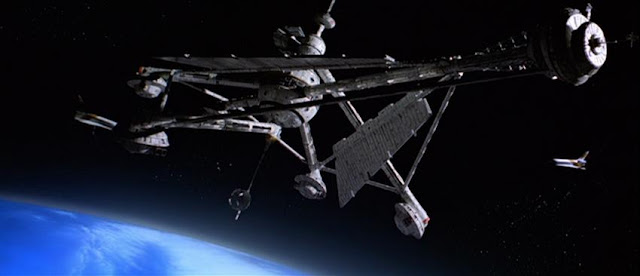I am very fond of the James Bond film Moonraker. While it's generally regarded as one of the weaker films in the 007 canon, I find it difficult to find too much fault with it. It's just too important a part of my life-long obsession with science fiction and spy-fi films for me to be too critical of it. And it is notable for showing just how influential the success of Star Wars and Close Encounters Of The Third Kind and other 70s sci-fi were - even Albert R. Broccoli, producer of ten highly profitable spy adventures starring British secret agent James Bond, felt commercially compelled to insert outer space elements into his eleventh cinematic escapade.
I was fifteen when the movie came out in 1979 (the same year as Meteor, The Black Hole and Star Trek - The Motion Picture), already a die-hard fan of science fiction and space-oriented films, and coverage of the movie in my monthly bible, Starlog, truly whetted my appetite. I had also just recently seen my first Bond film, Goldfinger, on HBO, so the prospect of seeing a 007 flick on the big screen was very exciting.
In the weeks leading up to its premiere, I picked up the Warren tie-in magazine, the fold-out poster magazine published by the Starlog folks, and the Jove Books novelization by screenwriter Christopher Wood. I also purchased and built the Moonraker space shuttle model. So when I went to the theater that fateful evening in May of 1979, I was pretty much predisposed to love the film.
For this 15 year-old, Moonraker had everything I could possibly want in a movie: space shuttles, lasers, beautiful women, exciting stunts and special effects, and most of all, a cool, suave, unflappable hero (admittedly, one with a somewhat juvenile wit).
Moonraker was the first James Bond film I saw in the theater, and I haven't missed one since. And while Goldfinger made me a Bond fan, it was Moonraker that made me a spy-fi fanatic. I still love it.
Sure, I wince now at Jaws' (Richard Kiel) ridiculous antics and his goofy romance sub-subplot, and Lois Chiles' performance as Dr. Holly Goodhead, NASA astronaut cum CIA agent, is astoundingly robotic... but she is quite lovely. And say what you will about the movie's faults – it looks spectacular (especially on Blu-Ray), with some of Ken Adam's most imaginative sets. Also, director Lewis Gilbert really keeps the film moving at a brisk pace. It's never boring and nearly always entertaining. On top of all that, it has John Barry's best Bond score of the 1970's.
Roger Moore looks great and has a couple of very effective scenes. The centrifuge sequence is a stand-out, and he even manages to give some weight and suspense to the video game climax. And, best of all, are Derek Meddings' remarkable miniature effects, all of them produced in traditional, hand-crafted manner (they didn't even have computerized motion-control cameras at their disposal). Some of the shots - like the Moonraker shuttles in their silos, or villain Hugo Drax's space station in orbit, still look incredibly convincing, even today.
By the time For Your Eyes Only came out two years later, I had seen many more 007 films on ABC TV, and had decided that I liked the more down-to earth, grittier Bond films better than the more fantastic ones. I had also decided that Sean Connery was the superior James Bond. I still believe that. But – you know, I really like Sir Roger, and sometimes I'm just in the mood for the more far out flix.
I still have my Warren tie-in magazine, poster magazine and paperback novelization. In fact, I really like the novel a great deal. Wood follows his own screenplay, of course, but still manages a fair approximation of Ian Fleming's style and characterization. His Spy Who Loved Me novelization is quite good, as well.
My love for spy thrillers continues to this day - in large part because of seeing Moonraker in the theater when I was 15... but I probably wouldn't have been in that theater at all if it wasn't for my devotion to sci-fi and space opera.
Tuesday, July 24, 2012
Subscribe to:
Post Comments (Atom)






0 comments:
Post a Comment